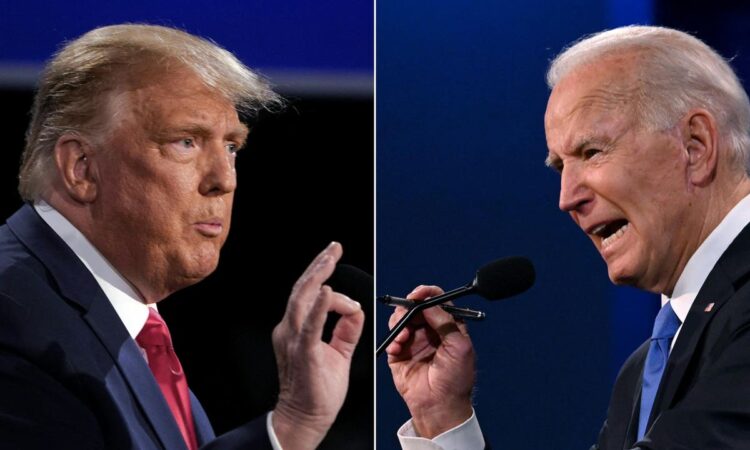
TOPSHOT – (COMBO) This combination of pictures created on October 22, 2020 shows US President Donald … [+]
AFP via Getty Images
As the 2024 U.S. presidential election ramps up, there is increasing media attention on voters who may decide which candidate to support based on their digital asset policies. Former President Donald Trump is making the most concerted efforts to court this part of the electorate with a recent post on Truth Social calling for “all the remaining Bitcoin
Bitcoin
Trump is leaning into the issue, a significant shift from his first term as president, when he described cryptocurrencies as “not money” and “based on thin air” in a social media post. His support for digital assets has quickly made him popular among cryptocurrency supporters, who have often felt at odds with the Biden administration.
President Joe Biden has backed a more speculative stance toward the industry, and many of his regulators view him as against digital assets. Securities and Exchange Commission Chair Gary Gensler is the most public face of this angst, as his agency has frequently clashed with large industry members and has filed several lawsuits against these businesses. A second term for Biden would likely mean four more years of continued skepticism and enforcement actions, even if Gensler were to leave the SEC.
The big question for Trump, though, is whether the strategy will pay off come November’s election. A poll commissioned by the Blockchain Association found that 20% of voters “in battleground states consider cryptocurrency a major issue in the 2024 election.” In addition, political scientist Grant Ferguson has found that the demographics of cryptocurrency users tend to align with those of swing voters.
However, there are reasons to be skeptical that this group will decide the election outcome. Trump certainly could gain among the fringes, which will matter in a close election. Still, the Blockchain Association poll may overstate the number of voters who will decide their vote based primarily on the candidates’ crypto policies.
In addition, with only a handful of states likely to decide the election winner, focusing on the crypto users in these states will give a better sense of how decisive this bloc could be. In the Rust Belt, Michigan, Pennsylvania, and Wisconsin were all below the national average in crypto adoption, based on an analysis of 2020 tax return data from the Internal Revenue Service published in a recent Forbes daily cover. A similar pattern is seen in Coinbase’s “United States of Crypto,” which listed all three states outside of the top 20 with the highest percentage of the population owning crypto.
According to 538’s presidential election model, these three states are among the most likely tipping points for the 2024 election. Based on current polling, it is likely necessary for Biden to win them to remain in the White House. This makes the electoral value of these states unquestionable. Still, the value of crypto voters in these states appears to be relatively low compared to other groups of potential swing voters.
Even if digital assets policy is not the deciding issue in this year’s election, it still can be a winner. Republicans generally have a more favorable view of the industry and have been more supportive of legislation and regulation at the federal level to promote crypto’s adoption. A Republican sweep would position businesses to potentially achieve the regulatory clarity they have been pushing for in recent years, particularly from regulatory agencies. Passing legislation through Congress — such as the market structure and stablecoin bills advanced in the House this year — may still be difficult with the need for 60 votes in the Senate. Still, a significant attitudinal shift would benefit the digital assets industry even though the legislation may not be a day-one priority in the next presidential administration.






